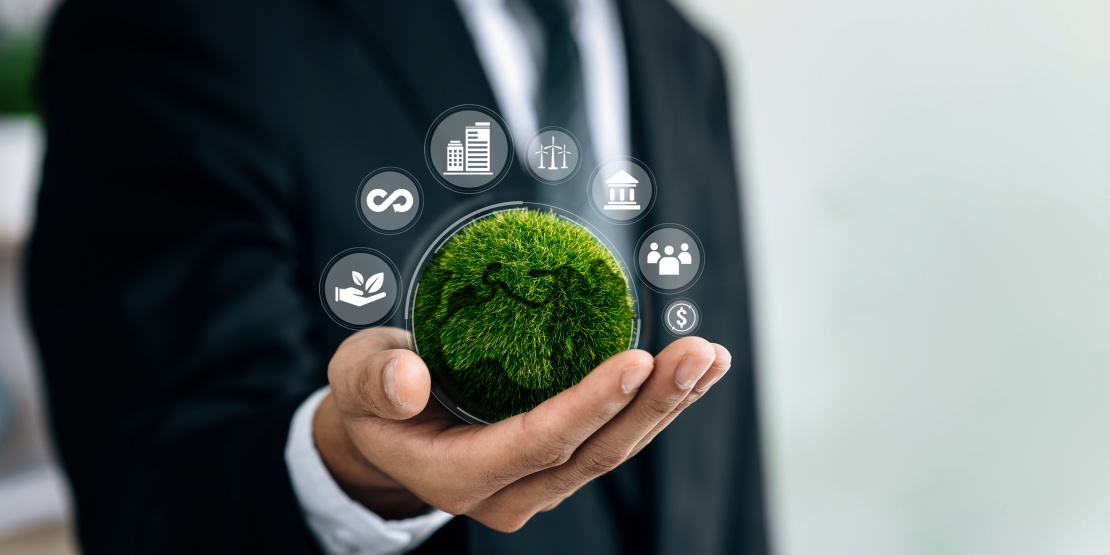Energy transition and sustainable development are two increasingly important concepts in the business world. Today, most of the energy consumed is of fossil origin. The increase in the greenhouse effect and global warming are the direct consequences of this. Companies have a role to play in countering this situation, both in terms of energy and sustainable development as a whole.
What are the energy transition and sustainable development?
First, before going into the challenges in more detail, it is worth defining what the energy transition and sustainable development are in order to have a clearer view of them.
The energy transition: Definition
The energy transition refers to any action that promotes more environmentally friendly and sustainable energy production and consumption.
While "traditional" energies are mostly derived from fossil fuels (coal, oil, natural gas), companies should now opt for getting access to energy from renewable i.e. non-exhaustible sources, including:
- Solar energy;
- Hydraulic energy;
- Wind power;
- Geothermal energy;
- Biomass fuel.
In addition to clean energy production, it is also necessary to change consumer habits.
The energy transition relies on 4 pillars:
- Reducing energy consumption, especially fossil fuels;
- Increasing the use of renewable energies;
- Reducing energy expenditure and greenhouse gas emissions;
- The eco-friendly transition to zero carbon.
Sustainable development: Definition
According to the description provided by the Brundtland report, written in 1987 as part of the UN World Commission on Environment and Development, sustainable development is "development that meets the needs of the present without compromising the ability of future generations to meet their own needs".
The three main areas of sustainable development are:
- The environment;
- Society;
- The economy.
Sustainable development, therefore, is aimed at adopting a more sustainable model so that everyone can live in a world that continues to develop economically, but more fairly, while preserving natural resources and the planet at the same time.
What are the main challenges of the energy transition and sustainable development?
The energy transition and sustainable development are two closely related concepts whose main stakes are intertwined.
The challenges of the energy transition
The global consumption of fossil fuels has increased considerably since the end of the Second World War, due to economic expansion. It had a negative impact on the planet by increasing the concentration of CO2 and greenhouse gases.
Faced with this situation, the energy transition is the obvious answer. Here are its main challenges:
- Reducing greenhouse gas emissions through the use of clean, renewable energy;
- Guaranteeing long-term energy security;
- Deploying technological innovations to support this transition;
- Involving everyone to ensure a fair and equitable growth.
In this last area, sustainable procurement is a major step companies can take towards the energy transition. They can help create a more sustainable and environmentally friendly future by adopting procurement practices such as:
- Working with responsible suppliers who are themselves committed to an energy transition approach;
- Favour products made from renewable energies;
- Opting for eco-friendly raw materials.
The energy transition is not only a matter of personal commitment, but also an obligation governed by law. In order to comply with current legislation, companies need to study scopes 1, 2 and 3 to assess their carbon footprint.
The challenges of sustainable development
As a response to the global ecological crisis, the goal of sustainable development is to use resources only if their sustainability for future generations can be guaranteed.
Among the sustainable development goals (SDG), there are many challenges:
- Fighting against climate change;
- Protecting natural resources
- Preserving biodiversity;
- Fighting for social equity;
- Maintaining sustainable economic growth;
- Involving companies in sustainable development actions.
Implementing a CSR policy based on data enables companies to better self-assess their actions and to effectively share their results with stakeholders so that progress can be made together.
What role do renewable energies play in sustainable development?
To respond to the climate emergency, renewable energies are the main solution for reducing greenhouse gas emissions. The electricity produced from these "clean" sources does not emit carbon dioxide or other atmospheric pollutants, which is a prerequisite for preserving the planet.
Sun, wind, water, biomass… These energy sources are naturally and continuously renewed. This means it is not necessary to continually draw on natural resources, except during certain stages of their use (assembly process, transport, etc.). Therefore, they help preserve the environment.
Unlike fossil energies, which are mainly concentrated in certain geographical areas, renewable energies are more evenly distributed throughout the world. A larger number of countries can therefore benefit from their use.
In addition to supporting energy self-sufficiency, booming renewable energies also generate economic activity, create jobs (research and development, energy renovation, etc.) and promote local resources. The more these energies are used, the more their price drops and the more competitive they become, encouraging people to use them even more.
The global energy transition thus meets current human needs while sustaining those of future generations and preserving the environment. It is directly in line with the objective of sustainable development.
Why support the energy transition and sustainable development?
Faced with climate change, the European Union is asking all its Member States to invest in the fight against global warming by taking the energy transition and sustainable development route.
The 2019 EU climate law and the 2050 carbon neutrality target is being updated with the "Fit for 55" bill[1]. It aims to reduce emissions by at least 55% by 2030.
Although it is a big challenge, there are lots of economic, environmental, and societal benefits to the energy transition and sustainable development:
- Preservation of global biodiversity and natural resources;
- More rational energy consumption;
- Better quality of life for the whole population;
- Job creation;
- Growth of new sectors of activity;
- Increased energy independence;
- Increased competitiveness of industrial sectors;
- Decarbonised global economy;
- Decrease of hazards related to global crises and to the decline of global purchasing power.









